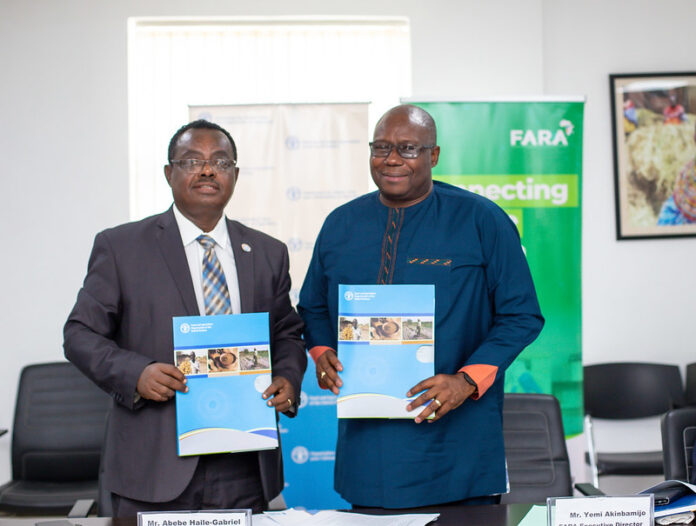The Food and Agriculture Organization of the United Nations (FAO) has signed a five-year partnership agreement with the Forum for Agricultural Research in Africa (FARA). The deal renews and formalizes the two organizations’ long collaboration.
Working closely with each other for more than 20 years, FAO and FARA are now pursuing a more strategic and sustainable partnership to facilitate greater collaboration for improved food and agriculture production and productivity in Africa.
“I am proud of what we have achieved so far but we also recognize that there is still room for stronger cooperation,” FAO Assistant Director-General and Regional Representative for Africa Abebe Haile-Gabriel said at today’s ceremony at the FAO Regional Office for Africa in Accra, Ghana.
“This Memorandum of Understanding will enable us to leverage each other’s strengths, align our actions with national and regional priorities, and deliver tangible results, creating greater impact on the ground,” he said.
“The complex challenges facing Africa’s food security and agriculture call for more effective partnerships and an holistic approach,” said FARA Executive Director Yemi Akinbamijo.
“This partnership will help us to jointly identify constraints and co-create solutions. Such a model will bring coherence in actions, enhance coordination and prevent duplication of efforts,” he said.
FAO and FARA have collaborated on various activities and initiatives since 2003. The new partnership is expected to facilitate greater collaboration, focusing on six areas, namely: capacity development for agricultural research and innovation systems, agriculture policy and advocacy, youth empowerment, response to crises, knowledge co-creation, exchange and data sharing, and joint resource mobilization and partnerships development.
The partnership aims to contribute to the 2063 Agenda of the African Union and specifically to achievement of the CAADP/Malabo Commitments on agricultural growth and transformation, by leveraging science and innovation This partnership will also contribute to achievement of the 2030 Sustainable Development Goals through the transformation to more efficient, inclusive, resilient and sustainable agrifood systems for better production, better nutrition, a better environment, and a better life, leaving no one behind.








